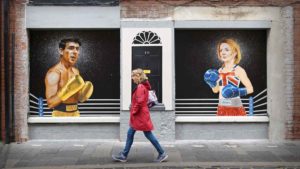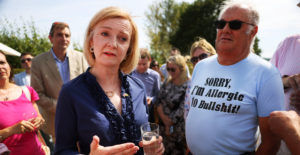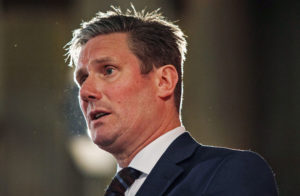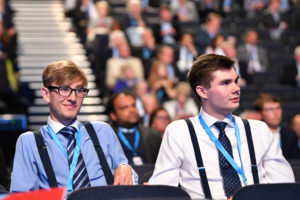“It’s just not something I talk about to people. It’s almost a heresy not to read The Guardian here.” Diane lives in Didsbury, one of Manchester’s most affluent suburbs. But even here, among the neatly pruned hedges, she feels isolated as a Conservative. There are Tories in Didsbury, perhaps a few hundred, but most of them vote for the Liberal Democrats. Didsbury used to have a Tory MP, Diane reminds me, but not since the Seventies.
Manchester is a city where people take great pride in not kissing Tories, not knowing any Tories, and definitely not electing a Tory to the city council. As in every other northern city, there are no Conservative MPs representing Manchester in parliament. But today, Liz Truss and Rishi Sunak will arrive for yet another leadership hustings.
They shouldn’t expect a warm welcome. They’ll be greeted outside the conference centre by the serried ranks of Manchester’s Left: the CND, the TUC, a local refugee charity and the people campaigning against having police officers in schools. “I have some good Manc Tory info for you but only if my placards are being put on the news,” one activist texted me yesterday.
“Manc Tory info” is in short supply, for the simple reason that there are hardly any Tories here. The party hasn’t had a councillor in Manchester since the Nineties and managed to gain fewer than 10,000 votes at this year’s local elections, less than 10% of the vote share. As a result, 91 of the city’s 96 councillors are Labour.
“It simply isn’t healthy to have this monopoly,” says Diane, recalling a time before the coalition destroyed the Lib Dem brand here, when it was conceivable that Labour could lose control of the town hall. “I resent the loss of an opposition in the City Council,” she says. And she’s right to be worried.
Labour has built a formidable electoral machine in this city, one that has maintained its grip on the working-class communities in the north of the city while benefiting from the influx of liberal young university graduates elsewhere. As a result, the city lacks meaningful political dissent: Manchester is a place where voters have handed Labour a virtual dictatorship but where the trains don’t run on time.
What is strange about this leadership contest is how detached it is from the issues that determine life here: the dreadful transport links to London or other northern cities, or the way in which energy bills and rising food prices are making every weekly shop stressful for poorer families.
If Truss and Sunak arrive by train this morning, they may get a taste of the nightmare that is playing out on the line from London, where Avanti West Coast has cancelled the majority of its services after staff “withdrew their goodwill” and refused to work overtime to keep services running. On Wednesday, passengers on one of the company’s trains were locked in a station late at night and had to scale a seven-foot spiked gate to escape.
These northern rail disasters don’t tend to get prominent national news coverage in the way they would if they happened in London. And generally speaking, they wouldn’t happen in London, which has benefited from decades of massive investment from Whitehall. As Mike Emmerich points out in his book about reviving Britain’s cities, real change only comes from “doing the right things, at scale, for a very long time”.
Liz Truss says she is committed to delivering Northern Powerhouse Rail — the much-needed new line connecting the northern cities — in full, rather than the pound-shop version laid out in the government’s recent Integrated Rail Plan. It hasn’t been a core theme of her campaign, but it would be hugely welcome. But real levelling up, as the Cambridge economist Diane Coyle told me recently, will involve changing Treasury funding formulas that have consistently benefited the South East, as well as a concerted effort to boost productive industries and create well-paid jobs across the region. Yet there’s plenty of evidence that candidates are planning to do the exact opposite.
Earlier this month, for instance, Sunak remarked in Tunbridge Wells that he had changed Treasury funding formulas because the ones he inherited from Labour “shoved all the funding into deprived urban areas”. The comment did him no favours in Manchester, where it reminded voters of the virulently anti-urban Toryism of the Thatcher years — the period that, along with the past decade of austerity, still frames this city’s view of the party.
“I remember a fist fight in my ex-wife’s family when someone said they voted Tory,” says Pete, who grew up in the city in the Sixties. “It’s deep, it’s visceral. If you lived through 1981 or 1982 in this city, you would know why.”
He mentions Patrick Minford, an adviser to Thatcher who’s now considered Truss’s economic guiding light, whose plan to close unproductive heavy industry caused devastation in areas like east Manchester. The Tory government, most people here believe, didn’t care about those who were losing their jobs and wasn’t willing to invest in their communities to soften the blow. “They completely fucked this city,” Pete says. “The absolute dogmatic ideological cynicism with which they did it was what turned these great cities into total fucking basket cases.”
Nowadays, Manchester in the process of rapidly un-fucking itself. From my office on St Ann’s Square you can often see more than a dozen cranes at work; one estimate says the city has more tall buildings in the works than any European city outside of London. The city centre is filling up at incredible speed — up from hundreds of residents in the Nineties to tens of thousands today.
Who deserves the credit? One Tory who does betray excitement about Manchester’s growth is George Osborne, whose Northern Powerhouse project was rooted here. “Manchester is buzzing — it’s one of the most exciting cities in Europe, it’s the go-to place for people who want to set up businesses outside London,” he told me last year.
I was interviewing Osborne for a profile I wrote about Sir Richard Leese, the man credited with overseeing Manchester’s economic renaissance this past decade, who stepped down as leader of the city council last year after a 25-year reign. Leese was a Labour pragmatist who gave private sector investors a leading role in the rebuilding of the city, and in doing so deeply antagonised figures on the Left. In a city with no prominent Conservatives, Leese was cast as a Tory by housing activists who felt he was “selling the city” and ignoring the need for affordable homes. One even emptied a glass of red wine over him during a fringe event at last year’s Conservative conference in Manchester.
The dislike was mutual. “They’re middle class tosspots and I hate them,” I overheard him saying at a drinks event last year. Leese understood the old adage that you don’t have allies — you have interests. And while other northern leaders didn’t want to be seen taking money or favours from Tory governments, Manchester’s Labour leadership was willing to criticise the Tories in public while cooperating with them in private.
“Everyone used to say ‘Oh, he’s favouring Manchester,’” recalls Osborne. “Well the truth was, yes, it was the city I knew best. But it was also because they had the most original ideas. They would come to the Treasury with ideas about how to finance the metro system or how to get money into the cultural sector or how to support school reform in the city. And you just didn’t get those ideas from the other big cities of England.”
Andy Burnham, whose job was created by the historic devolution deal Greater Manchester struck with Osborne in 2014, has learned lessons from Leese’s tenure. Burnham’s best-known moment as mayor was his public confrontation with the government two years ago over lockdown funding. But the “King of the North” has generally chosen diplomacy over pitch battles with Tories in Westminster. The council leaders who sit with him around the Greater Manchester table have urged Burnham to be more critical of the government at key moments — for example after the recent announcement of an underwhelming bus funding package — but have been left disappointed.
As the Tory leadership race rumbles on, Burnham and his officials have been negotiating with key figures in Whitehall over their promised “trailblazer deal” — the next instalment of devolution. The mayor wants more funding and powers in areas like education, and someone involved with the talks told me they are getting a positive response from some Whitehall officials.
“The problem is, we don’t know who we are really negotiating with,” one insider told me last week. It won’t be civil servants who sign off a new devolution settlement or “levelling up” policy — it will be Truss or Sunak. So when the candidates arrive today, they will likely be greeted with more charm by the power-brokers in Manchester — behind closed doors, of course — than by the activists out on the street.
This sums up the nature of political debate in Manchester, which takes place, as far as it exists, within a closed shop. Scrutiny will be kept to a minimum and local problems, such as the skyrocketing rates of homeless people living in emergency accommodation, will remain unsolved. Meanwhile, Diane is unlikely to get her wish of being represented by a Conservative councillor or MP in the next few years. But I think she’s right to ask the question: wouldn’t Manchester be better if it had more voices in the room?
Disclaimer
Some of the posts we share are controversial and we do not necessarily agree with them in the whole extend. Sometimes we agree with the content or part of it but we do not agree with the narration or language. Nevertheless we find them somehow interesting, valuable and/or informative or we share them, because we strongly believe in freedom of speech, free press and journalism. We strongly encourage you to have a critical approach to all the content, do your own research and analysis to build your own opinion.
We would be glad to have your feedback.
Source: UnHerd Read the original article here: https://unherd.com/







